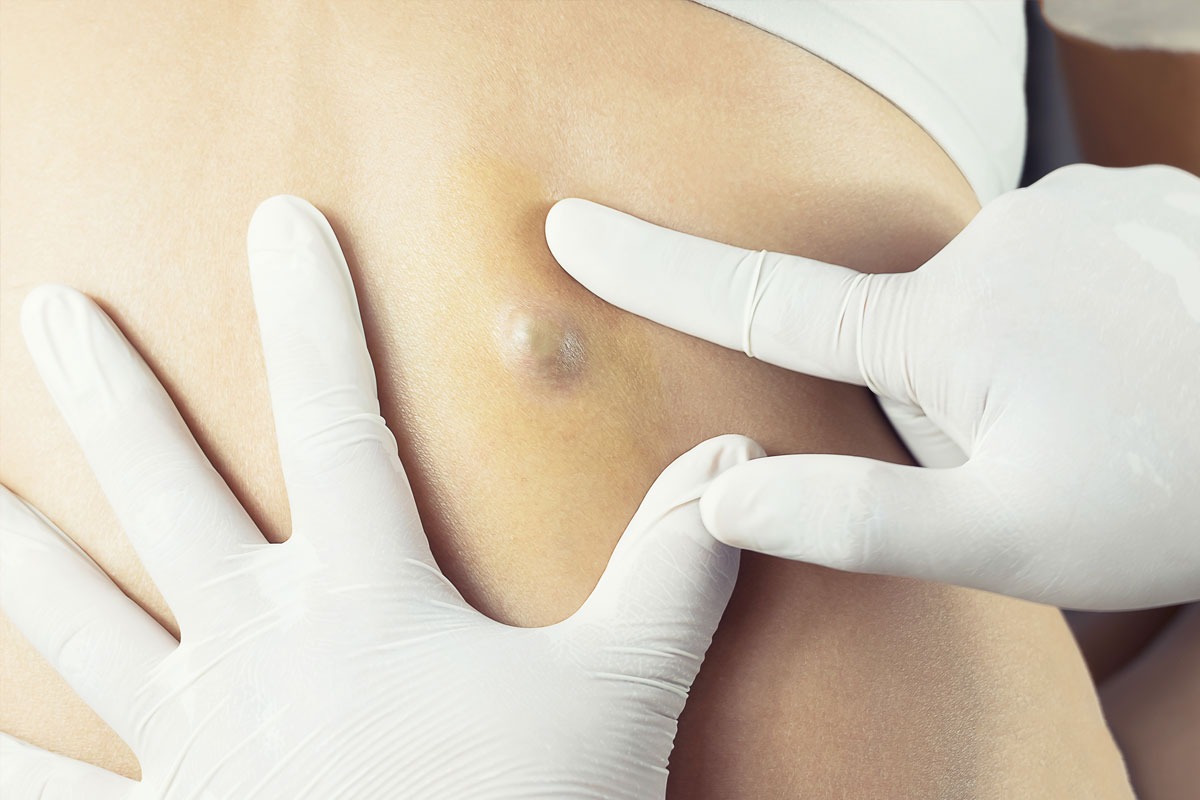
-
Doctor:
Dr. Lukesh Patil
-
Service
Sebaceous Cyst Removal
-
Tag:
Sebaceous Cyst Removal in Navi Mumbai
Are you dealing with an uncomfortable lump under your skin that won’t go away?
Sebaceous cysts are common and usually harmless, but they can sometimes cause pain and irritation. At Seraphic Aesthetics, we offer safe and effective sebaceous cyst removal treatment. Our experienced team, led by Dr. Lukesh Patil, prioritises your comfort and well-being at every step.
What is a Sebaceous Cyst?
A sebaceous cyst is a closed sac beneath the skin, often filled with a protein called keratin. It forms when sebaceous glands are blocked, leading to the accumulation of material and the formation of a lump. These cysts can vary in size, ranging from small and barely noticeable to larger, more prominent bumps under the skin.
Sebaceous cysts typically appear on the face, neck, scalp, or back. They are usually soft to the touch and slow-growing, making them easy to identify. Though not dangerous in most cases, a cyst may need medical attention if it shows signs of infection, grows rapidly or causes pain. Dr. Lukesh Patil offers expert consultation and treatment for all types of sebaceous cysts.
Sebaceous Cyst Symptoms
Sebaceous cysts can vary in appearance and symptoms, depending on their size and whether they are infected. Here are some common signs to look for:
-
A small, round lump under the skin.
A soft or firm texture when touched.
A slow increase in size over time.
Redness, tenderness, or warmth in the area (signs of infection).
Pus drainage, especially if the cyst is infected.
Discomfort or irritation due to rubbing against clothing or pressure.
Some cysts remain asymptomatic and may only be noticed due to their appearance. Others, particularly larger or infected ones, can cause significant discomfort.
Sebaceous Cyst Diagnosis
Diagnosing a sebaceous cyst is usually straightforward. We use a combination of clinical expertise and advanced tools to confirm the nature of the cyst and recommend the best course of action. Here’s what to expect during your diagnosis:
-
Physical Examination: A detailed assessment of the lump’s size, shape, and location.
Ultrasound: To determine what the cyst is made of, and rule out anything more serious.
CT Scan: For atypical or deep cysts, this helps us plan the safest surgical route.
How is a Sebaceous Cyst Treated?
Treatment options for sebaceous cyst removal depend on factors like size, location, and symptoms. Here are some effective methods:
-
Laser-Aided Excision: A minimally invasive option where a laser creates a small opening to drain the cyst.
Conventional Wide Excision: Removes the entire cyst but may leave a longer scar.
Each procedure is performed under local anesthesia, ensuring comfort and safety. Surgical removal is the most effective option for preventing recurrence and providing long-lasting relief .
Sebaceous Cyst Removal Surgery Cost
The cost of sebaceous cyst removal surgery can vary widely depending on a combination of factors. At Seraphic Aesthetics, we prioritize transparency and value, to provide a superior patient experience.
Size of the Cyst: The size of the cyst affects the removal process. Larger cysts may need more complex procedures, which can increase costs.
Location of the Cyst: Where the cyst is located matters too. Cysts in sensitive or hard-to-reach areas often require more advanced techniques and greater care, which can also impact costs.
Type of Procedure: The removal method can significantly influence the price. Techniques like laser-assisted removal or punch excision may be more expensive than traditional wide excision methods.
Post-Procedure Care: Aftercare is important as well. Follow-up visits, necessary dressings, and any medications can add to the total costs involved in the process.
Why Choose Us?
When you choose Seraphic Aesthetics for sebaceous cyst removal, you’re not just choosing a medical procedure you’re choosing a team committed to helping you feel your best. With a patient-first approach, we ensure that everyone receives personalized attention and expert care tailored to their unique needs.
Expertise You Can Trust
Privacy and Safety Assured
Compassionate Care
Post-Treatment Support
Book Your Consultation Now!
Don’t let a sebaceous cyst cause you unnecessary worry or discomfort. At Seraphic Aesthetics, we’re here to help you find the best solution.
During your visit, we’ll assess your condition, explain your treatment options, and answer all your questions. You’re in expert hands with Dr. Lukesh Patil and our dedicated team, and we’re here to support you every step of the way. Schedule your consultation today!
Frequently Asked Questions
What causes sebaceous cysts?
Sebaceous cysts form when sebaceous glands become blocked, leading to the buildup of a soft, keratin-filled pocket beneath the skin. This blockage can happen for several reasons, including trauma, skin injuries, infections, or even genetic predispositions.
Are sebaceous cysts dangerous?
In most cases, sebaceous cysts are harmless and do not pose a threat to your health. However, they can become problematic if they grow large, become infected, or are located in a sensitive area.
Is sebaceous cyst removal painful?
Sebaceous cyst removal is typically performed under local anesthesia, which numbs the treatment area. Patients generally experience little to no pain during the procedure, and any post-operative discomfort is usually mild and manageable with the medications prescribed.
How long does recovery take?
Recovery after sebaceous cyst removal is typically quick. Most patients return to their daily routines within 24-48 hours, and full healing occurs within a week. However, recovery might take a little longer in cases of larger or more complex cysts.
Does cyst removal leave a scar?
Cyst removal techniques are designed to minimize scarring, but depending on the size and location of the cyst, some level of scarring may occur.
